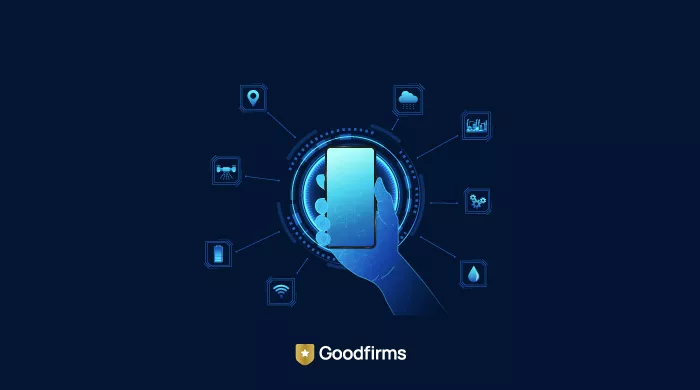Backup is a vital process that makes the functioning of present-day businesses smooth and secure. No company can do without deploying standard backup software in their IT systems. The internet age years of 2010 - 2019 have witnessed some horrific and unfortunate data loss disasters. The mishaps of Southwest Airlines, Delta Airlines, Pixar, and many more are enough to justify the importance of quality data backup when managing data backups for businesses. These companies have suffered losses of millions of dollars because of poor data backup infrastructure, substandard data recovery strategy, and improper data disaster management implementation.
#CASE
An IT employee used the usual deletion command ‘rm’ in Linu.' 'He later realized that he had deleted the wrong directory. Those who work on Linux would understand that this was a grave mistake. Unlike Windows and Mac operating systems, you cannot recover a file from Linux after giving the 'rm' command' The content will not be moved to the trash in Linux. So, once a file is deleted, it cannot be recovered without a backup.
Backup software is the lifeline of data, which is 24/7 prone to cyber attacks, system failures, hardware faults, software glitches, and data deletion due to human mistakes, including disgruntled employees' attempts.
What is Backup?
Backup is the process of creating duplicate and exact copies of data that might be needed in the future. It safeguards data from being lost, as it can be restored using the backup files. Backup is one of organizations' most vital and complicated processes to safeguard their valuable data. Backup is carried out by specific software suites or applications known as Backup software.
What is a Backup Software?
Backup software allows users to create backups of their data from computers, mobile devices, tablets, hard drives, and/or servers. Its features make the process of creating backups easy and cost-efficient.
What are the various methods of creating Backups?
- Full PC Backup: Copying the complete source data files, including the associated settings and configurations of the whole computer system or hard drive, is called Full Disk Backup.
- Differential Backup: Differential backup refers to copying only those files that have changed since the last backup.
- Incremental Backup: Incremental backup is an addition to the existing backup. If the source disk has changed data or new data was added to it, incremental backup automatically adds only the newly created extra data.
- Disk Imaging: Disk imaging is the process of creating an archive of the source disk on a destination disk, which can later be used to make more copies of the hard drive.
- Disk cloning: Disk cloning creates a clone of the source disk into another hard drive.
- Mirror backups: Mirror backups are pretty similar to complete backups. But unlike full backups, mirror backups don't allow the concession of all files together. Files need to be individually compressed if required.
- Local Backups: A local backup occurs when the destination disk is kept close to the source disk. Usually, the storage disk is directly connected to the source computer.
- Remote backups: Sometimes, IT administrators take the backup of distant computers remotely without physically accessing them. This is known as Remote backup.
- Cloud backups: The backup data is uploaded to cloud servers directly. A cloud backup uploads the source disk data to cloud servers directly. Many third-party vendors provide cloud backup services.

Need for Backup Software
- Companies cannot risk storing all their data on a single computer, hard drive, or server. Any blow to one will wipe out all the valuable data it has. Creating multiple storage points for important data requires hardware and software capabilities of backup software.
- All backups are not simple copy-and-paste functions that create duplicate files. Some backups require complicated functionalities, such as creating exact duplicate copies of the OS, configurations, and system settings of one computer to another. This cannot be done without deploying backup software. Even if companies use hardware to store data, it is not feasible to keep a backup for such a massive amount of data files.
- It is arduous for companies to keep the data safe and secure. They need to use the advanced and professional services of data backup software that possess the expertise and compliance that organizations don't have.
- It is not easy for large companies to back up a large amount of data to external drives without deploying backup software.
- Companies can't process content backups in customized formats. Functions like compressed data backups, backups of old and new versions, differential and incremental backups, remote backups, etc., are not possible without backup software.
Benefits of using Backup Software:
- Backup software protects against power failure, abrupt electricity cut-offs, etc.
- Backup software loads data quickly. It saves a lot of time. Companies are spared from wasting time in managing the data.
- Once a backup is taken, the data is disaster-proof, more secure, and safe, with multiple layers of security provided by the backup software.
- If companies lose valuable data, they must bear a lot of costs. Backup software saves time and costs by safeguarding the data.
- Lost files or loss of old versions of important files can cause a massive blow to a company's profitability. Backup software retains all versions of a document.
- IT administrators often have to spend a lot of time addressing other employees' employees lost or deleted files. With backup software, this task becomes easy for them.
- Companies don't have don't operational breakdowns. In case of mishaps, the backup quickly gets them ready.
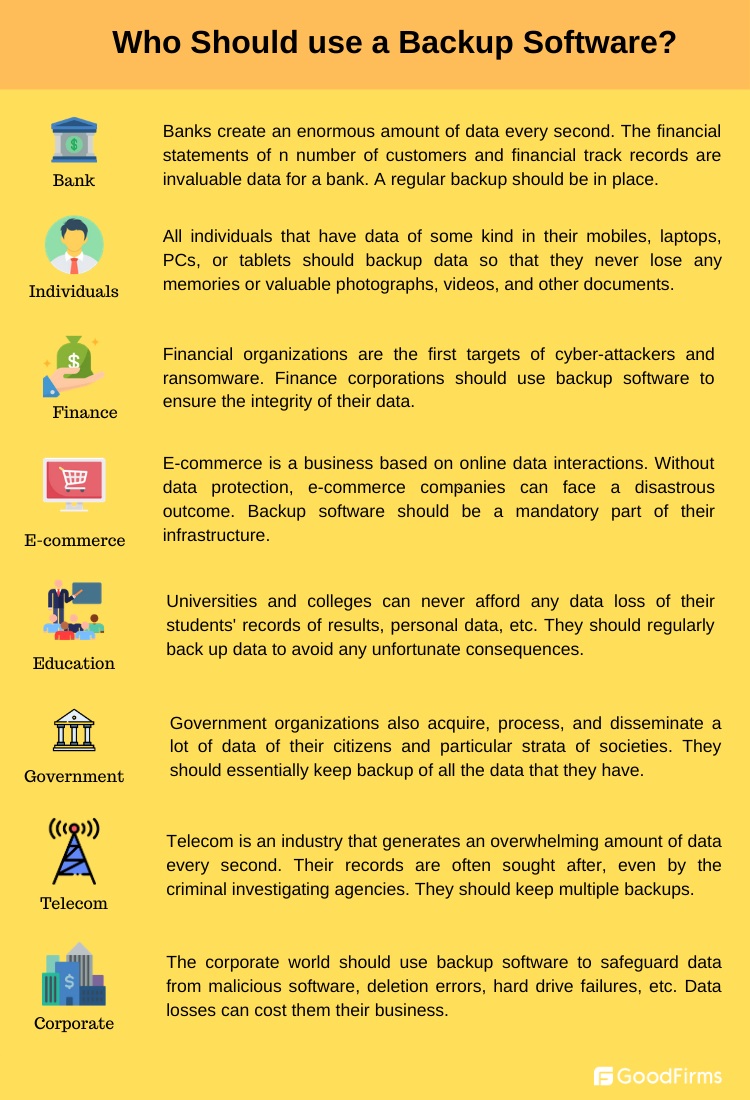
Features of Backup Software:
- Automatic Backups
Backup software provides the option to take automatic backups at a frequency set by users. It can automatically initiate the backup process monthly, weekly, daily, or hourly.
- Real-time Backups
Backup software can back up all data in real time if enabled.
- Incremental and differential backups
The Backup software allows users to take customized backups, such as incremental and differential backups.
- Compression
The Backup software has features to compress the data to create optimal backups. This reduces storage needs, and more backups can be taken.
- Retrieving data:
The stored backup data can be retrieved to specific disks, paths, or folders whenever needed.
- Encryption:
Most backup software converts the data to an encrypted form for security purposes, ensuring its safety and security.
- Schedule backup
The backup software allows users to schedule data backups and establish time frames for backup at their convenience.
- Remote backup
It allows remote data backing for distant computers.
- Storage
Some backup software solutions also provide paid storage solutions to store your data on their servers safely.
- Access Control
It allows users to retain control over the data by restricting access. Only people with admin rights can view or import backup data.
- Version Control
It also allows users to back up and restore files with all older versions.
- Reports and Analytics:
The Report and analytics provide users with information and details about the backup history, usage, and other related things.
Before we discuss the best free and open-source backup software, we recommend that you familiarize yourself with ManageEngine OS Deployer, a popular backup tool.
OS Deployer
OS Deployer by ManageEngine is a top-notch imaging and backup software that reduces manual efforts in OS deployment, cutting down backup costs and standardizing the systems. Users can create, customize, and deploy OS images with advanced offline and online imaging techniques through a simple and easy-to-use dashboard. Attractive graphs and visualizations are also available to quickly view pictures by OS, images by status, deployment by OS, deployment by status, and drivers by class.
IT professionals from all industries can leverage this software to quickly backup, restore, and migrate user accounts, OS data, files, and other relevant configurations during system upgradation. Leading companies such as Siemens, Costco, Tata, CBRE, etc., rely on this tool to fulfill their organizational needs when performing and restoring backups.
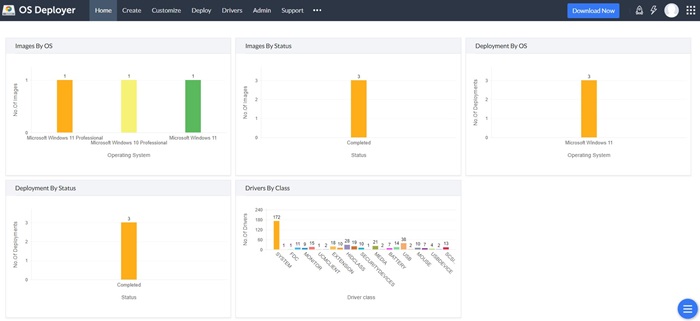
(Source: OS Deployer)
Prime Features of OS Deployer:
- Flexible boot options
- Customizable deployment templates for image partition selection, system-related configurations, disk adjustment settings, etc.
- Live disk imaging using the latest technologies
- Automated driver management
- Seamless user data migration
- Easily reinstall the operating system on a virus-ingested computer or network.
- Zero-touch deployment with automated booting
- Easy 4-step process to create backup images
See below for the list of 10 free and open source Backup Software:
- Duplicati
- Areca
- Urbackup
- Bareos
- Fbackup
- AOMEI
- Easeus
- Paragon
- Unitrends
- Iperius Backup
Comparison table of the 10 free and open-source Backup Software
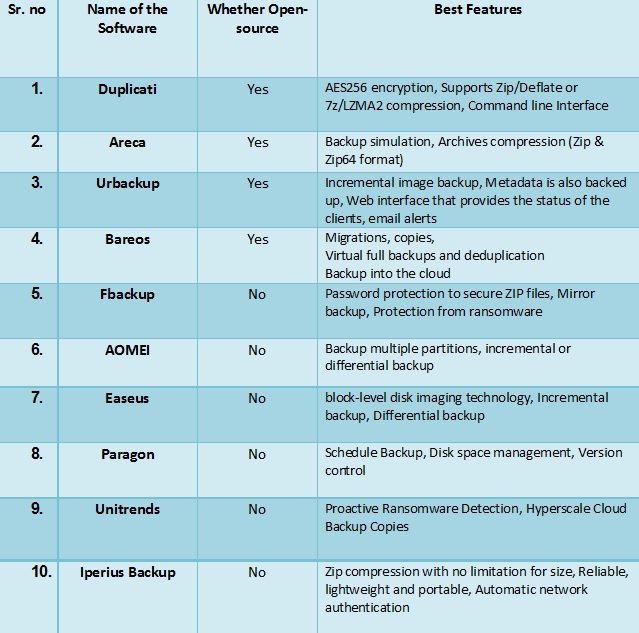
1. Duplicati 2.0
Duplicati is a free backup software for creating encrypted backups online for Windows, macOS, and Linux. It is an open-source software suite. It requires .NET 4.5 or Mono. It works with standard protocols like FTP, WebDAV, and SSH and is compatible with Microsoft OneDrive, box.com, Amazon Cloud Drive & S3, Google Drive, and many others. It handles network issues efficiently. Duplicati uses strong AES-256 encryption to protect your privacy. Duplicati is licensed under LGPL.

Features:
- It uses strong AES-256 encryption to protect your data. All data is encrypted locally.
- Duplicati initially takes a full backup. Later, it will take incremental backups of only the data that has changed since the first backup.
- It supports Zip/Deflate or 7z/LZMA2 compression. All data is compressed before encryption.
- Duplicati initiates online backup verification by randomly downloading a set of backup files and checking whether they can be restored easily. This helps identify corrupt or virus-infected storage systems.
- Duplicati’s Duplication process searches and analyzes the file's contents for duplicate content. It finds duplicate files and stores them only once in the backup.
- Its fail-safe design can manage network hiccups, corrupt storage, and interrupted backups. Duplicati can also try to repair files that get corrupted.
- Duplicati can be installed on NAS for the web interface. It allows users to configure and run backups remotely.
- It provides a command-line interface
- Duplicati stores the metadata and timestamps of files in the backup.
- A built-in scheduler to run backups
- It comes with a built-in updater
- Backup open files in Windows by Volume Shadow Copy Services (VSS), and for Linux-based devices, it uses Logical Volume Management (LVM)
2. Areca
Areca is a free and open-source backup solution released under the General Public License (GPL) v2. It allows you to backup a select set of files/directories and choose the kind/format of backup required. Users can opt for simple file copies or zip archives. A post-backup action, such as sending backup reports via email, is also available. It is very simple to set up, versatile, and interactive software.
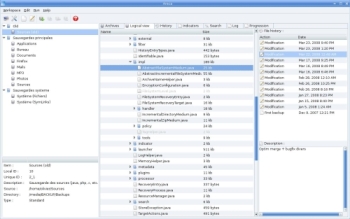
Features:
- Archives compression(Zip & Zip64 format)
- Archives encryption(AES128 & AES256 encryption)
- Storage on the local hard drive, USB, network drive, FTP, FTPs, or SFTP server
- Multiple source file filters
- Incremental, differential, and full backup support
- Recover your files as of a specific date
- All critical processes are transactional.
- Generates backup reports
- Areca can launchshell scriptspost-backup.
- Content explorer to find files
- It provides information about an archive, such as title, description, date, etc.
- Keep track of your files' histofiles'versions
- Backup simulation
- Command-line interface
- Backup automation.
3. Urbackup
UrBackup is an open-source backup system for file and image backups. It can create a backup of the running system without interrupting the current processes. Currently, there are over 21,000 running UrBackup server instances. It is free software licensed under the OSI-certified AGPLv3+. Clients adhering to the terms and conditions of the license are allowed to use and redistribute UrBackup for personal and commercial purposes.
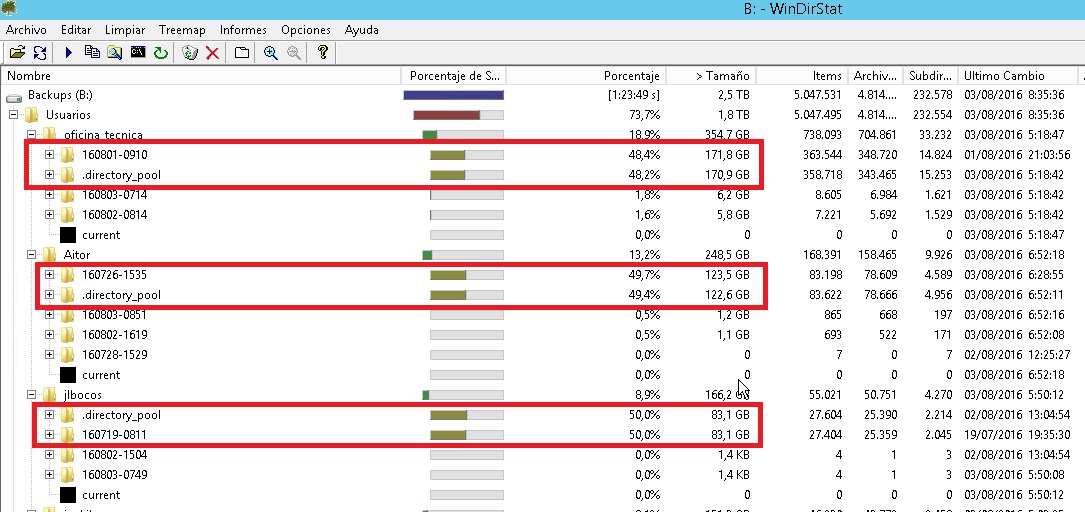
Features:
- Auto-update enabled
- Backup for Windows, Linux, and FreeBSD
- Incremental image backup
- File backups, even while the file is running
- Consistent backups of files on Windows and Linux
- Checks for duplication and the duplicate files on different computers are saved only once
- Users can define their settings like backup frequency or number of backups
- Users are alerted if no backup is taken for some time
- Web interface that provides the status of the clients
- Reports about backups sent to users or administrators
- Secure and efficient backups
- Metadata is also backed up
- Easy to use file and image restore
- Easy to configure and use
- E-MailEmails if the backup is not taken for a configurable amount of time
4. Bareos
Bareos is an open-source backup system by Bacula. It's free and licensed under AGPL 3. Bareos stands for Backup Archiving Recovery open-sourced. Bacula emerged from a 2010 project. Bareos is popular for features such as LTO hardware encryption, new practical console commands, and bandwidth limitation. It provides binary package repositories for both Windows and Linux distributions.
Features:
- All general backup features
- Backup disk and tape drives
- Full, incremental, and differential backup
- Migrations, copies,
- Virtual full backups and deduplication
- Backup into the cloud
- Compression
- Encryption
- Open interfaces to easily integrate into any existing IT environments
- Bareos supports IPv6
5. Fbackup
FBackup’s siFBackup'srface makes it appealing to people with little technical knowledge. It has a friendly wizard that guides users through the backup process. Users have first to define clearly what kind of backup they need. It has features that ask users questions about the intended backup. Once the users set the required backup definitions, they can make a backup by pressing the Backup button (or F6). Users can also add a scheduler to run this process automatically. FBackup is used to take a backup of local drives to destination drives. Fbackup provides free data protection. FBackup is free for both commercial and personal use.

Features:
- Automatic backups
- Scheduled backups
- Zip compression with ZIP64 (can create up to 2GB Zip file)
- Password protection to secure ZIP files
- Mirror backup
- Protection from ransomware
- It allows users to clear previous backups and start afresh backup
- Post-backup actions such as setting the computer on hibernate, logging off, standby mode, or shut down can be done
- Updates are installed automatically every week
- The destination drives that Fback supports for backup are USB/Firewire drives, CD/DVD/BluRay, mapped network, and online services such as Google Drive and Dropbox.
- Feedback can back up a currently open file. The Windows volume shadow service used by Fbackup enables the backup of files that are in use.
- Multi-language interface
6. AOMEI
AOMEI is a free backup software for the backup needs of your Windows PC. Users can create a system backup, file backup, and file sync of their computer system. It is also a disaster recovery tool to restore Windows in case of OS failure. It can also do disk cloning to upgrade HDD to SSD. It's easy to use, and anyone without technical knowledge can use it. Clients can use AOMEI without needing specific technical skills or knowledge.
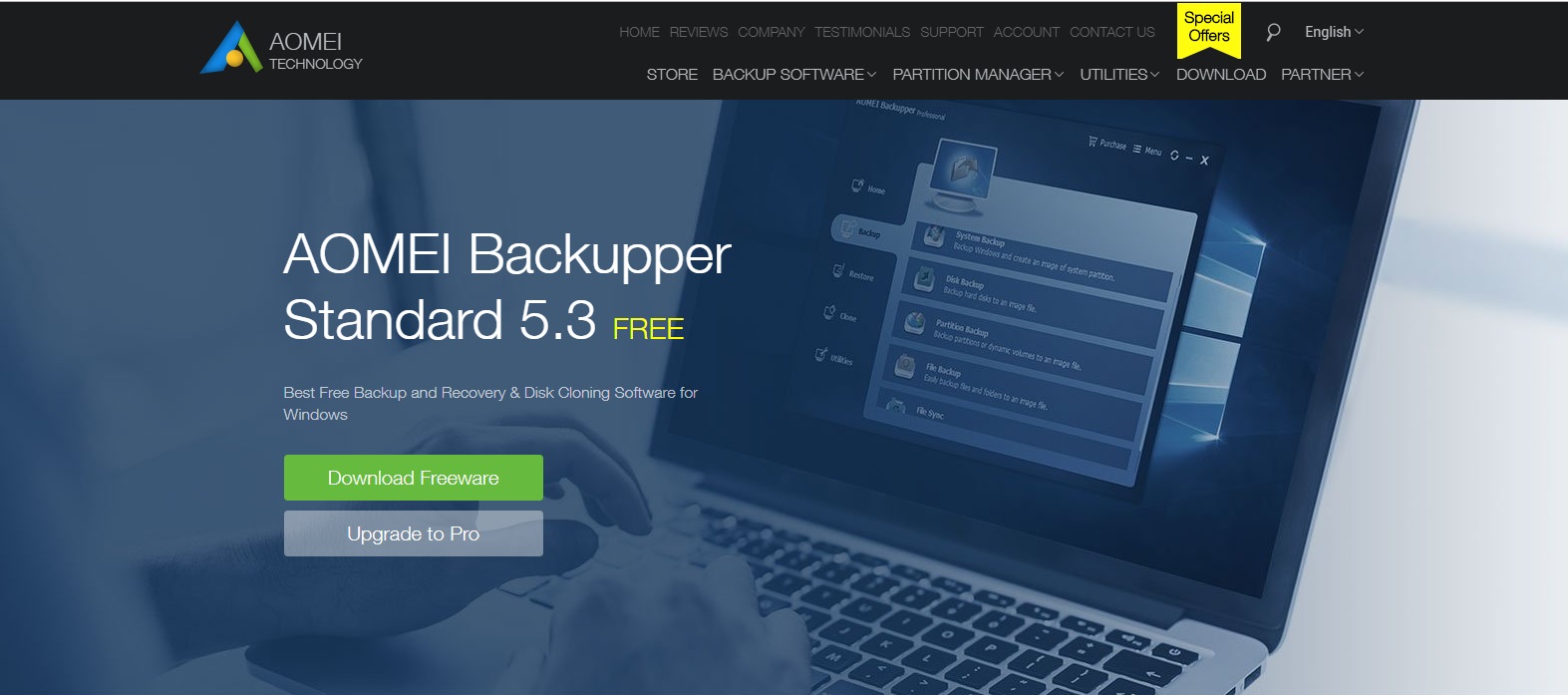
Features:
- Backup all contents in the system drive
- Backup Windows operating system, too
- Customize settings
- Backup to external hard drive, NAS, USB flash drive, and network drive.
- Multi-backup files/folders
- Backup all kinds of hard drives such as external disk, internal disk, USB flash drive, the hard drive on NAS, SD card, and other storage devices recognized by Windows
- Instead of taking a backup of the entire disk, Backup only specified partitions or volume
- Backup multiple partitions to a compressed image file
- Incremental or differential backup strategy
- Schedule to automatically backup
- Clone your hard drive to another HDD or SSD
- Sync files from one location to another regularly
- real-time sync files: Sync files to an external drive, SD card, USB flash drive, mapped network drive, etc
7. EaseUS
Easeus is Backup software that protects and saves your data from technical glitches and hardware blunders. The free EaseUS backup software schedules and runs backup actively regularly. EaseUS accessible data backup has tremendous restoring capabilities and recovers everything from backup copies at an incredible speed. It ensures your data is safe, available, and never distorted.
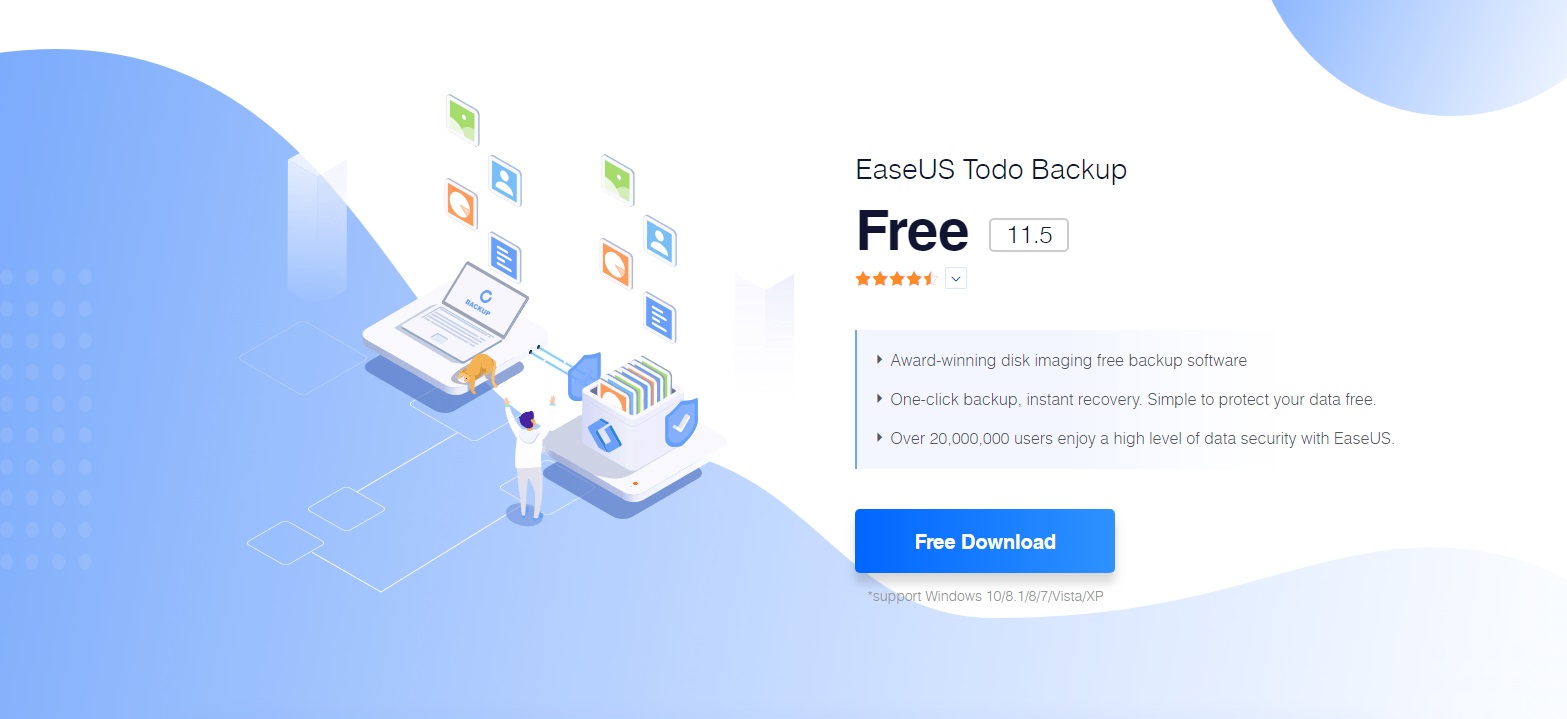
Features:
- Back up your entire system to another location, ensure you always have access to a bootable system
- Back up your system, file, disk, partition
- Create copies of files or folders of different formats, including network and shared data. Full backup
- Incremental backup
- Differential backup
- Schedule backup upon time
- With block-level disk imaging technology, backs up your entire partition, HDD/SSD, and volume.
- EaseUS backup restores lost data quickly, in seconds, from the backups you create, saving your digital life while data is frequently changed or updated. Once your system crashes or fails, restore it without reinstalling it and keep it running as usual.
8. Paragon
Paragon lets users back up files, disks, and volumes. Users can decide to back up all at once or one at a time. Users can select the OS partition to be backed up. In case of an operating system crash, the backup easily recovers it. Paragon allows clients to define and customize new backup parameters and strategies. Users can underline the needed backup type, retention, frequency of backup, backup schedule, and scenario-based backups by themselves.
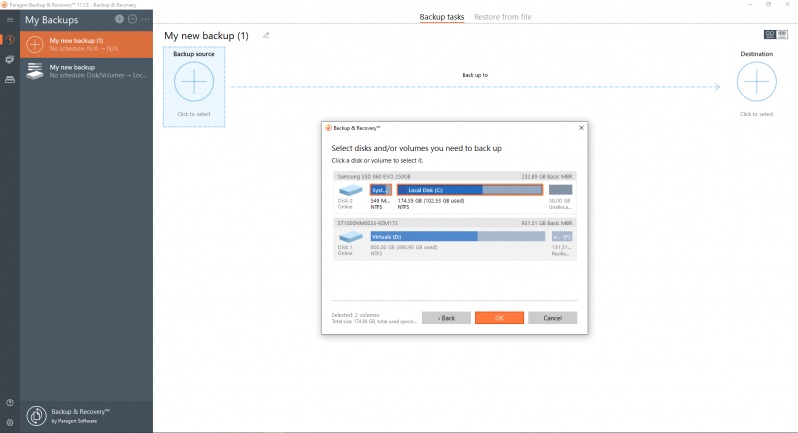
Features:
- Schedule Backup
- Disk space management
- Version control
- Mount archives by setting a drive letter
- Browse like a regular disk on a PC
- Recover separate files
- boot the system from a bootable USB stick
- Restore your entire OS
- Backup all installed programs and user settings
- Backup all data within the WinPE environment.
9. Unitrends FreeTM Backup
Unitrends Free™ protects up to one terabyte of data for free. Unitrends Free is free backup software providing powerful backup capabilities. Unitrends provides enterprise-class instant recovery. It reduces downtime significantly. Protecting your backups is essential for any sound backup strategy. It has highly secured offsite compliance. Unitrends Free integrates with popular cloud providers such as Amazon Web Services (AWS) and Azure. It provides users with unlimited VMs or sockets protected for VMware or Hyper-V. Users can create backup recovery points every day.
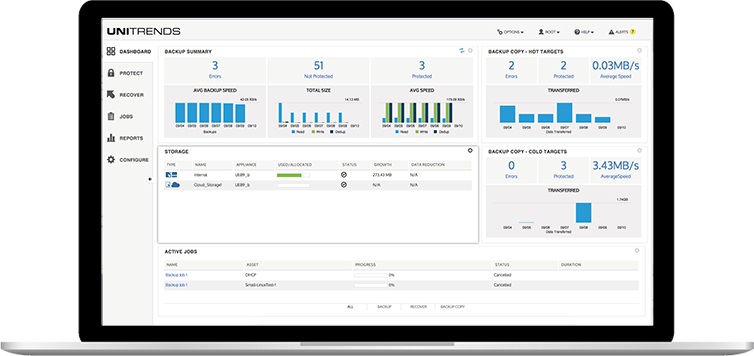
Features:
- Supported Environment
- 24×7 Customer Support
- Hyperscale Cloud Backup Copies
- VMware vSphere Hypervisor-Level Protection
- Proactive Ransomware Detection
- Self-Service for Application Owners
- Physical and Virtual File Protection
- Compression
- Hyper-V Hypervisor-Level Protection
- VM Recovery (Instant, Full, File)
10. Iperius Backup
Iperius Backup is a top free backup software with advanced features. The free version of Iperius Backup lets users take backups to any data storage device, such as NAS, hard drives, external USB, RDX drives, and networked computers. It is also available in commercial editions. One of the limitations of the freeware version is that it cannot make file synchronization. If you want the advanced backup types such as backup to Cloud (One Drive, Google Drive, Dropbox), backup of databases, remote backup FTP, and Drive Image backup (disaster recovery), upgrade to the commercial editions. If you need technical support, then also you need to upgrade.
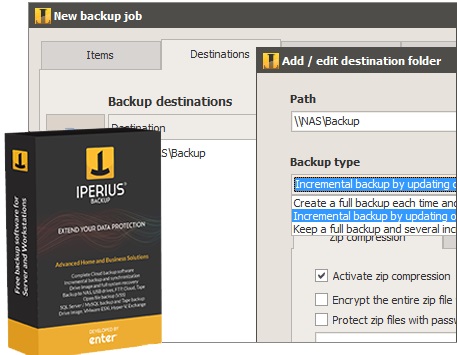
Features:
- Automatic backup and email implications
- Incremental backup to disk, USB, NAS, and network computers
- Advanced filters, running and execution of external scripts, and compression
- Compatible with XP, 2003, Windows 7, Server 2008, Windows 8, Windows 10, Server 2012, Server 2016, Server 2019
- Complete planning functions
- Backups based on specific days and times
- Create multiple backup schedules
- Keep multiple backup copies
- Supports zip compression with no size limit
- No file number limit
- Compress files with longer paths (more than 255 characters).
- Keeps a history of all backup operations
- Creating easy-to-read HTML log files
- Backup to any storage device
- Unlimited number of backup jobs
- No license limitation, No expiration
- Advanced filters for specific files or folders
- Full, incremental, and differential backup
- Zip compression with no restriction on size
- Reliable, lightweight, and portable
- Automatic network authentication
We have included one more business backup software for discussion owing to its popular stature as a complete backup and data archive solution. Nova Backup is an unbeatable backup software that made our list for its best-in-class service and robust features. Let us discuss it in detail:
#Novabackup
With NovaBACKUP, users can safely and quickly back up their data. The automatic scheduling feature allows you to rest easy, knowing that your data is protected daily, weekly, and monthly. Whether you want to restore a file or an entire system, the advanced functionalities of the Novabackup software make it easy.

Features:
- Nova backup features a military-grade 256-bit AES encryption
- Free central monitoring through Nova backup. Cmon
- Local and off-site backups
- Full and incremental backup
- Schedule backup
- Full protection from ransomware
- Boot disk option for bare-metal restore
- Restore data to an alternate location
- Email Emailication for a backup reminder
- Supports NTFS formatted drives
- Compression
Conclusion:
Backup software is designed to save organizations from any unforeseen event that may cause them to lose valuable data. It is like an essential infrastructure that is a must for the smooth running of the organization. It is not something that organizations may choose to deploy or not, but it is a necessary tool that all businesses should possess, irrespective of the size and scale of their business.
The richness of new data formats and the advent of new applications and technologies, such as IoT, has caused a spike in the amount of data generated annually. While the #SaaS licensing model for vendors that provide backup solutions was already present, the new IT frameworks such as #Hyperconvergence have already revolutionized how data is stored. Amazon’s AWSAmazon provides high-end and cost-effective backup options at the petabyte scale.
The field of data storage and backup has a long way to go. Backup software can be improved further by adopting new technical capabilities. Companies seek vendors that follow the guidelines of the General Data Protection Regulation to protect data from cyber-crimes and entrust them with the latter’s valuable data. Businesses should choose their backup software solution provider carefully, and selecting data security over cheap costs is always wise.
While businesses can use any of the free and open-source backup software discussed in the article for their backup purposes, if they want more features, they can also try premium backup software such as Acronis True Image, Carbonite, Retrospect Backup, and Nakivo.
We will be happy if you share your thoughts in the comments section below. If you have used the services of any of the free and open-source backup software mentioned above, don't forget to share your feedback with us.
If you wish to refer to any backup software or any software category other than backup software, then look at our software directory.






